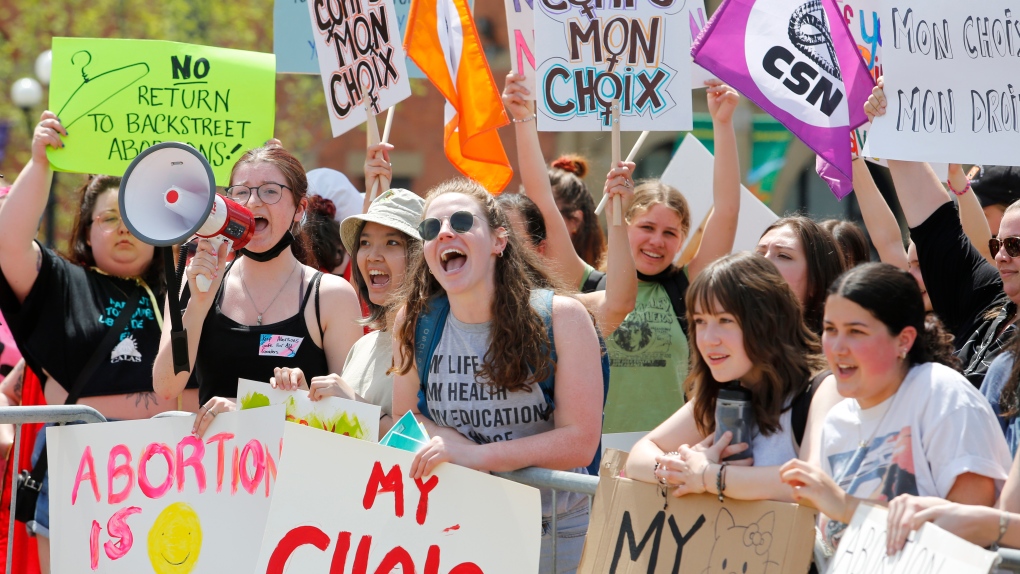Majority of Canadians support legal protections for abortion, survey finds
 People protest against the March for Life on Parliament Hill in Ottawa on Thursday, May 12, 2022. THE CANADIAN PRESS/ Patrick Doyle
People protest against the March for Life on Parliament Hill in Ottawa on Thursday, May 12, 2022. THE CANADIAN PRESS/ Patrick Doyle
Decades after abortion was decriminalized in Canada, a new survey suggests the majority of citizens think it’s time to codify access in law.
In the final installment of a three-part series exploring the politics of abortion in Canada, the non-profit Angus Reid Institute found 57 per cent of people polled would like to see legislation to protect access to abortion services.
Support for a law enshrining abortion rights grows to 60 per cent in B.C., although the study found seven per cent of people in the province want to see abortion legally restricted. The remaining one-third of British Columbians don’t see legislation as necessary.
Instead of implementing new legislation, some abortion rights advocates argue governments should use the tools they already have to improve access to reproductive health services.
"National reproductive rights groups in Canada do not support a law to enshrine abortion rights, as we believe this could politicize the issue even more, and subject the right to ongoing interference in the future," said Joyce Arthur, executive director of Abortion Rights Coaltion of Canada said.
Respondents in the Angus Reid poll were also asked whether they support political parties banning anti-abortion candidates – a policy adopted by both the federal Liberals and NDP – and were divided down the middle. Men over the age of 34 were the most likely to oppose a ban, while women under the age of 35 were the most likely to support one.
Fifty-six per cent support withholding federal health transfer payments to provinces that don’t provide reliable access to abortion services.
More funding, not less is needed for provinces to expand sexual and reproductive health-care services, including abortion, says Arthur.
“Provincial governments should ensure access in every region so people don’t have to travel, and license midwives to provide medical abortion,” said Arthur, adding that medical schools need to provide more training and opportunities for future abortion providers.
In the first part of the three-part series, Angus Reid found nearly three-in-10 Canadian women experience an unplanned or unwanted pregnancy in their lifetime. For those that had an abortion, 16 per cent say it was difficult or impossible to access.
A 2016 report from the UN Human Rights Commissioner highlighted concerns about disparities in access to abortion services and affordable contraceptives in Canada.
The committee recommended Canada ensure access to legal abortion and affordable contraceptives in all provinces and territories, with an emphasis on helping women and girls in poverty or remote areas.
“Ensure that the invocation of conscientious objection by physicians does not impede women’s access to legal abortion services,” is another recommendation in the report.
While access problems still exist in Canada, Arthur appreciates the progress that’s been made in the past few decades.
“We’ve come a long way with many victories achieved. Dozens of clinics now provide abortion that didn’t exist in 1988, abortion is fully funded almost everywhere, we have the abortion pill, and we’ve successfully fought back every attempt to restrict abortion in law,” Arthur said.
CTVNews.ca Top Stories

More than 115 cases of eye damage reported in Ontario after solar eclipse
More than 115 people who viewed the solar eclipse in Ontario earlier this month experienced eye damage after the event, according to eye doctors in the province.
Last letters of pioneering climber who died on Everest reveal dark side of mountaineering
George Mallory is renowned for being one of the first British mountaineers to attempt to scale the dizzying heights of Mount Everest during the 1920s. Nearly a century later, newly digitized letters shed light on Mallory’s hopes and fears about ascending Everest.
Toxic testing standoff: Family leaves house over air quality
A Sherwood Park family says their new house is uninhabitable. The McNaughton's say they were forced to leave the house after living there for only a week because contaminants inside made it difficult to breathe.
An emergency slide falls off a Delta Air Lines plane, forcing pilots to return to JFK in New York
An emergency slide fell off a Delta Air Lines jetliner shortly after takeoff Friday from New York, and pilots who felt a vibration in the plane circled back to land safely at JFK Airport.
B.C. seeks ban on public drug use, dialing back decriminalization
The B.C. NDP has asked the federal government to recriminalize public drug use, marking a major shift in the province's approach to addressing the deadly overdose crisis.
Sophie Gregoire Trudeau on navigating post-political life, co-parenting and freedom
Sophie Gregoire Trudeau says there is 'still so much love' between her and Prime Minister Justin Trudeau, as they navigate their post-separation relationship co-parenting their three children.
Decoy bear used to catch man who illegally killed a grizzly, B.C. conservation officers say
A man has been handed a lengthy hunting ban and fined thousands of dollars for illegally killing a grizzly bear, B.C. conservation officers say.
'I was scared': Ontario man's car repossessed after missing two repair loan payments
An Ontario man who took out a loan to pay for auto repairs said his car was repossessed after he missed two payments.
First court appearance for boy and girl charged in death of Halifax 16-year-old
A girl and a boy, both 14 years old, made their first appearance today in a Halifax courtroom, where they each face a second-degree murder charge in the stabbing death of a 16-year-old high school student.































